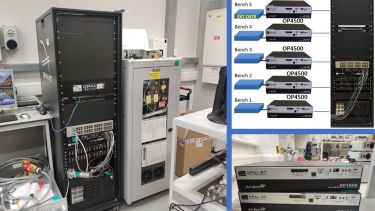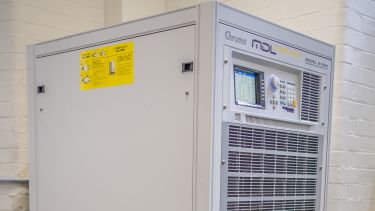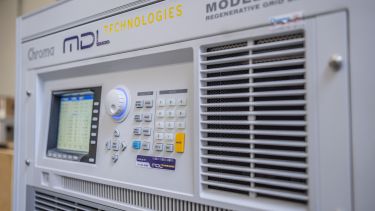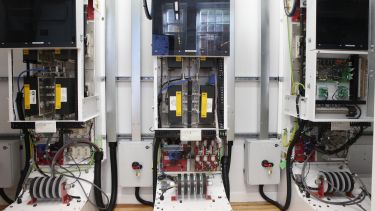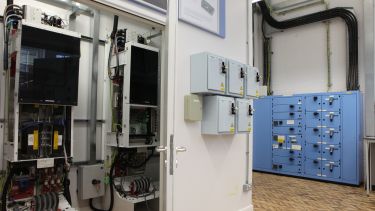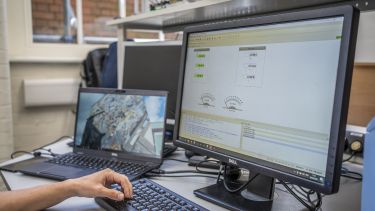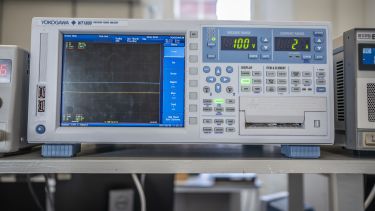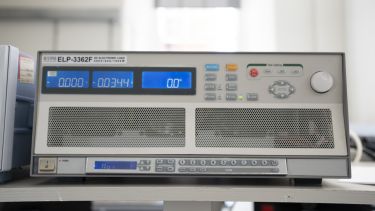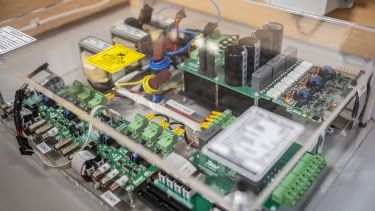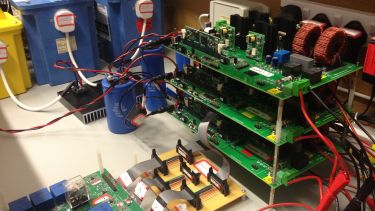Control and Power Systems Lab
The Control and Power Systems Laboratory (CAPS) focuses on advanced control systems, optimisation, and cybersecurity with applications to power systems, smart grids, microgrids, and power electronics converters.

The Control and Power Systems Laboratory (CAPS) focuses on advanced digital technologies for power grid simulation, monitoring and control, cyber-physical system, AI and optimisation techniques, and cybersecurity with applications to power systems, smart grids, microgrids and wider energy systems.
The CAPS Lab develops high-performance grid simulators and a wide range of power systems experimental equipment. The CAPS Lab brings academics, research associates, engineers, and PhD students together to find new ways to improve the resilience and security of power grids. We are a part of the Department of Automatic Control and Systems Engineering at the University of Sheffield, located in the Sir Frederick Mappin Building on Mappin Street.
Key research
Meeting net-zero environmental targets towards reduction of national carbon dioxide emissions substantially promotes energy generation from renewable energy sources such as wind and solar power. However, the transition from conventional fossil-fuel based power plants to renewable generation raises new challenges for network security, operational resilience and robust control across cyber-physical aspects of power systems.
The research carried out in CAPS is a step towards the design, commissioning, and operation of resilient renewable-based power grids, with advanced digital technologies and control systems which will pave the way towards sustainable, affordable, and resilient electrical energy and a low carbon energy future.
Power systems digitalisation
An electrical power system is a classic cyber-physical system consisting of a physical system (the electricity assets and networks of power grid) and a cyber system (sensing, information and communications). Due to recent advances in smart metering infrastructure as well as wide area monitoring protection and control, the data and information flow are significantly increased across various new entities of power system including distributed energy resources. Challenges such as cybersecurity will significantly impact the future power system operation. Electricity system operators and intelligent systems need to work together to operate and protect cyber-physical power system in a time-limited and resource-constrained operating environment.
At CAPS, we investigate digitalisation technologies that could potentially improve the monitoring and control of power grids in both cyber and physical aspects. We explore the advanced grid monitoring platform, state estimation techniques, cybersecurity strategy, contingency analysis, vulnerability assessment, and robust network control.
Co-simulation of digital power grid
An important industry application of digitalisation is through cyber-physical digital simulators, as a concept of “co-simulation” to process models and analyse data for real-time power system operation. A current approach for co-simulation is to integrate various simulators such as PSCAD/EMTDC (for power systems) and NS2/3 (for cyber systems). Co-simulation is interpreted as a synchronisation problem and standardisation challenge between time-driven (physical) and event-driven (cyber) systems. The model’s complexity leads to computational infeasibility to achieve fast and accurate real-time online simulation, with increasing challenges to simulate distributed energy resources.
At CAPS, we develop co-simulation platform for digital power grids, that enables the fundamental integration of cyber and physical simulators for the accurate, efficient and large-scale grid simulation. Our work involves the interfacing design for model-to-model integration of different complex networks, simulation synchronisation at various time steps, and advanced computing methods and algorithms to create a co-optimised analysis of cyber-physical power systems.
- Advanced Control of Power Electronics Converters
-
Power electronics converters are the key enabling technologies in a large number of applications, including electric/hybrid vehicles, more electric aircraft, zero-emission ferries, and renewable energy generation, which are changing society towards electrification and independence of fossil fuels. The efficient and reliable performance of these applications mainly rely on the effectiveness of control systems in power converters. At CAPS, we develop novel control strategies for different types of power converters, e.g., DC-DC converters, DC/AC grid-tied converters, and multi-level converters.
- Autonomous Microgrids
-
Microgrids are small-scale electrical distribution networks composed of distributed generation units, local loads, and energy storage systems, operating in grid-connected or islanded modes. Microgrids are used in many mission-critical applications such as military bases, hospitals, data centres, and industrial plants and play a key role in providing resilience, low-cost, and sustainable electrical energy at community-level generation. At CAPS, we focus on DC, AC, and hybrid microgrids and develop control, optimisation, and cybersecurity algorithms for the reliable operation of islanded microgrids. Our proposed methods inspired from networked control systems, non-linear control, bounded integral control theory, plug-and-play control, and robust control ensure the robust and resilient operation of microgrids and are evaluated on the state-of-the-art microgrid testbeds available in CAPS.
- Control and Optimisation in Smart Grids
-
Integration of renewable energy sources such as wind and solar into power grids impose significant challenges in terms of stability and control. Renewable energy sources are normally integrated into power grids through power electronics converters that do not intrinsically provide inertia. The low-inertia characteristic of the converter-interfaced renewable energy sources poses major technical challenges to current grid operations. At CAPS, we apply predictive control theory and efficient optimisation algorithms to address control and planning challenges in smart grids and power-electronics-based grids.
- Reliability and Resilience of Power Electronics-based Power Systems
-
With an increasing paradigm shift towards a low carbon energy future, there have been changes in electrification in transportation, buildings, industrial sectors, and renewable-based energy generation. Power electronics converters play a vital part in these sectors; hence, their reliability and resilience are essential for the electrification revolution. At CAPS, we develop design-oriented analysis and control tools for improving reliability and enhancing resilience in power electronics-based power systems.
Facilities
We have a range of state-of-the-art facilities that enable us to run the real-time simulations of power systems with thousands of electrical nodes, hardware-in-the-loop simulations for the design and testing of power equipment, Analog and Digital Input and Outputs (I/O) to interact with multiple experimental setups, laboratory testbed for microgrid, and a demonstration platform for power electronics converters and advanced energy technologies.
- Real-time Digital Simulator (Opal-RT and Typhoon)
- 30kVA Chroma Regenerative Grid Simulator
- 3x200k VA power converters with reconfigurable connections to form a microgrid system
- Remote monitoring and control of the Translational Energy Research Centre (TERC)
-
Precision Power Analyser and DC Electronic Load
-
Multiple power electronic converters (DC/AC and DC/DC)
Grants and awards
- UKRI Future Leaders Fellowship, PI: Xin Zhang, “Digitalisation of Electrical Power and Energy Systems Operation (DEEPS)” £1,490,121, 2022-2026, MR/W011360/1
- EPSRC New Investigator Award, PI: Xin Zhang, “Aviation-to-Grid: Grid flexibility through multiscale modelling and integration of power systems with electrified air transport” £402,860, 2022-2025, EP/W028905/1
- Defence Science and Technology Laboratory (DSTL), PI: Xin Zhang, George Panoutsos, “Human Resilience in Cybersecurity of Future Energy Systems” £100,000, 2023-2027, RQ0000024688
- UK Department for Transport, Transport-Technology Research and Innovation Grants, “Solar-Hydrogen-Storage Integrated Electric Vehicle Charging Station in Future Cities” £30,000, 2020-2021, T-TRIG 2020, as PI
- EPSRC, Supergen Energy Networks Hub Flexible Fund, “GRid flexibility by Electrifying Energy Networks for Airport (GREEN Airport)” £50,000, 2019-2021, EP/S00078X/2, as PI
- UK Department for Transport, Transport-Technology Research and Innovation Grants, “Aircraft to Grid (A2G): Hybrid and Smart Charging for Electric Aircraft” £30,000, 2019-2020, T-TRIG 2019, as PI
- EPSRC-UKRI Innovation Fellowship, PI: George Konstantopoulos, “Affordable and clean energy via resilient and autonomous micro-grids” £515,136, 2018-2025, EP/S001107/1
- EPSRC-UKRI, G. Konstantopoulos, Energy Revolution Research Consortium – Core – EnergyREV. Research Consortium with 29 Investigators across 22 UK universities on whole-system approach in smart local energy systems (https://www.energyrev.org.uk/) December 2018 - March 2022, £9,063,172, EP/S031863/1
- Innovate UK, G. Konstantopoulos, I. Esnaola, D. Bauso, “ADvanced multi-Energy management and oPTimisation time shifting platform (ADEPT)” Collaboration with Infinite Renewables Ltd., GS Yuasa Battery and Swanbarton on the development of intelligent industrial microgrid, August 2017 - January 2019
- Grantham Centre for Sustainable Futures, G. Konstantopoulos, M Walker, M. Mayfield, Developing smart and resilient micro-grids in rural Africa. Enabling energy access in sub-Saharan Africa. January 2017 - December 2017
- EPSRC (Summer vacation bursary programme), G. Konstantopoulos, Control design technologies for the power electronic system of electric vehicles. Research project experience for MEng student Andrew Holmes. June 2016 - August 2016

